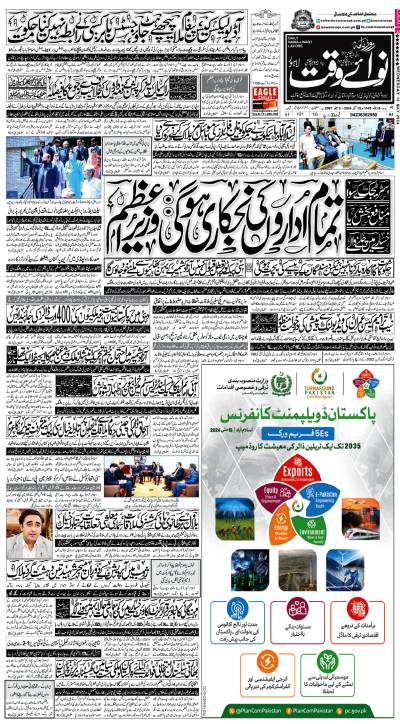Somehow, Sino-Pak relations have become solely dependent upon the success or otherwise of the China-Pakistan Economic Corridor (CPEC). Any discussion begins and ends with the benefits of this ‘flagship project’ and the slow progress in implementing the related various infrastructure and energy-based ventures. The intangible tussle between Islamabad and Baluchistan on ‘commanding and controlling’ CPEC projects, along with the employment opportunities, assessments on the correct utility of the Gwadar port and Chinese concerns over Pakistan’s procrastination in doing its part, have disproportionately politicized an otherwise purely economic endeavor. In fact, for Pakistan, CPEC has added a defensive talking point when Pak-US relations comes under discussion especially in the context of America’s China-containment policy.
Indeed, CPEC has become a political tool for the US and India to conveniently use against China and Pakistan. China could effectively sustain external pressure and counter the politically motivated propaganda targeted at it. How the successive governments in Islamabad since the inception of this mega project in 2013 have handled the pressure is an entirely different story. Here, taking credit for signing the Agreement seems more important than reaping the fruits or proper implementation of various projects. The frequent use of the future tense, promising Pakistan’s seriousness in achieving CPEC’s objectives and repeatedly announcing ‘our resolve’ seems to be the name of the game.
China is likely to ‘stay the course’ while ‘moving mountains’ and ‘braving wind and rain’ against all odds. Let the Western skeptics worry about the true nature and objectives of China’s Belt and Road Initiative (B&RI). Guiding a country of 1.4 billion people towards the ‘Great Rejuvenation of the Chinese Nation’ President Xi Jinping’s ‘Grand Polito-economic Project’- involving more than 150 countries and international organizations is expected to integrate Africa and Eurasia - from Indonesia to Kazakhstan to Djibouti to Kenya to Italy, Austria, and Poland. Islamabad needs to understand that CPEC is just one part of China’s colossal investments in transport, energy, and maritime infrastructure.
Celebrating a decade of CPEC projects was a correct move in the right direction. Besides affirming China’s steadfastness in seeing CPEC through, the visit of Chinese Vice Premier He Lifeng to Islamabad last week, gave a clear message to the world. The Sino-Pak bilateral relations are between two States regardless of which government is in Islamabad. However, the celebrations must remind the stakeholders in Pakistan of the sheer usefulness of this ongoing venture in the context of fulfilling Islamabad’s commitments in its next phase. Regardless of the reported ‘lapses’, China is still interested in completing the CPEC-related goals. Let us focus on ‘actions’ instead of ‘words’ and avoid blaming others. Additionally, China has made it clear that it would keep supporting Pakistan no matter how precarious the latter’s economic and political disposition might be. For the outgoing government in Islamabad, the visit provided the much-needed diplomatic boost at the fag-end of its challenging stint.
In all probabilities, the soon-to-be-appointed interim government would be busy holding the much-awaited general elections. The government that emerges after the elections would certainly wish to strategically place pieces on the policy-chessboard. It is time to reflect, inter alia, on Pakistan’s foreign policy particularly in the context of Sino-Pak relations:
One: There are no permanent friends or foes in international relations. What remains permanent is the national interest of a country. Pakistan’s relations with China must be seen objectively and pragmatically instead of basing it on emotions and expectations.
Two: China is Pakistan’s time-tested international partner. However, like any other developing country, Pakistan needs more friends to comfortably breathe in the comity of nations. Hence, relying solely on China as a friend in need is not advisable. That certainly does not mean taking sides. Diplomacy is all about creating a balance in inter-se relations while focusing on making additional friends. The inconsequential debate on joining blocs must not be encouraged. There is no need to announce or even point towards any such decision. You cross the bridge when you get there.
Three: As Pakistan’s relations with China or the US could never be on equal footing, Islamabad’s responses need to be carefully calibrated. For instance, for China, Pakistan is one part of its overall peace-centric foreign policy. Strategically important but not exclusive. On the other hand, for Pakistan, China covers a large chunk of its foreign policy. That does not mean you compromise on your vital interests. Moreover, favourable policymaking must not be confused with putting up summaries for the PM’s approval. It is a far bigger task than it is perceived in Islamabad.
Four: Once the misgivings between Pakistan and the US are removed, the next big test would be to deal with Pak-US and Sino-Pak relations separately. The idea is to create a balance between these two important equations in a way that each is initiated, maintained, and sustained without creating inter-se frictions. If you have a headache, you do not cut off your head. You find a Panadol. The newly appointed Foreign Secretary Syrus Qazi would know where to find this diplomatic analgesic.
Five: The seriousness that CPEC demands must be shown by Islamabad in practical terms. However, CPEC must not be seen as the end of the road in Sino-Pak relations. Keeping politics and individualism out of Pakistan’s national interest, securing other investment and trade related projects from China and other countries should be the objective. In doing so, we may wish to go beyond TAPI and CASA. Furthermore, instead of signing additional agreements and MoUs, the focus must be on the implementation of the previously penned documents.
Six: The recent months have seen Pakistan literally begging for funds. In this ambiance, talking about having an ‘independent’ foreign policy does not make any sense whatsoever. Secondly, speeches on putting one’s house in order must be substantiated by correspondingly appropriate actions. Not being able to pay debt-services and using flowery language to show your drafting prowess cannot go together. Even with the best of drawing rooms, your kitchen must be able to run smoothly. Lastly, it may be realized that Geo-politics and Geo-economics are not mutually exclusive. Both can be pursued in tandem.
Wednesday, May 15, 2024
Foreign Policy and China

The writer is a former Ambassador of Pakistan and author of eight books in three languages. He can be reached at najmussaqib1960@msn.com.
Indian batter Suryakumar Yadav continues to rule T20I rankings
5:24 PM | May 15, 2024
Railways launches premium lounge car offering over 40 dishes
5:15 PM | May 15, 2024
IHC grants bail to Imran Khan in £190m Al-Qadir Trust case
5:12 PM | May 15, 2024
Pakistan conducts successful training launch of Fatah-II Guided Rocket System
5:09 PM | May 15, 2024
SHC orders swift action on missing persons recovery
5:03 PM | May 15, 2024
Heat Alert
May 15, 2024
Tax Reform
May 15, 2024
Crisis Averted
May 15, 2024
Time Is Now
May 14, 2024
Power Abuse
May 14, 2024
Success of Lunar Mission
May 15, 2024
Service disruption
May 15, 2024
Weather Crisis
May 15, 2024
Reforming the Wheat Purchase System
May 15, 2024
Political Instability
May 14, 2024
ePaper - Nawaiwaqt
Advertisement
Nawaiwaqt Group | Copyright © 2024





